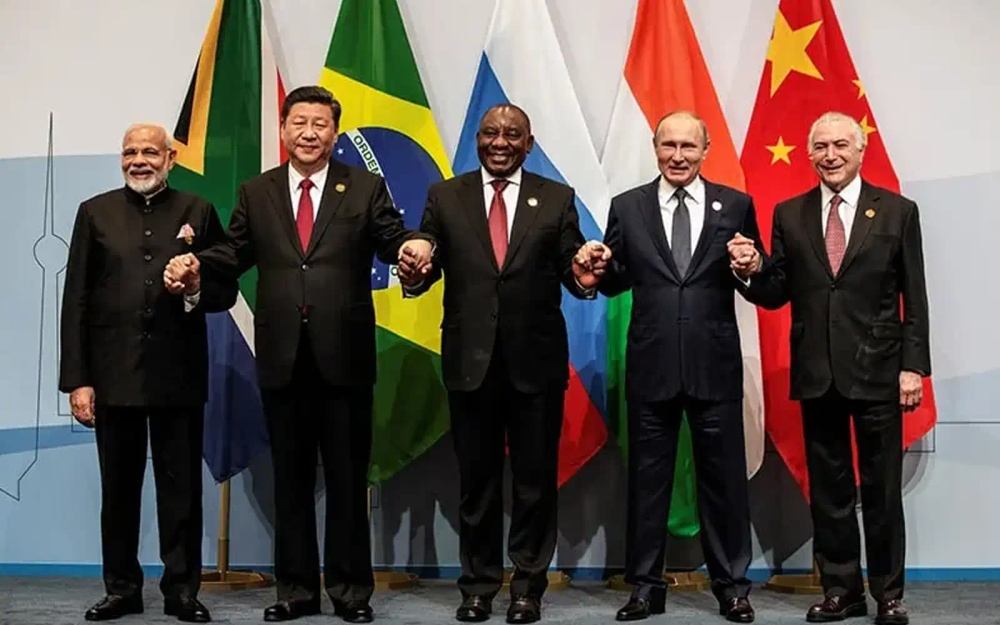Published
- 4 min read
BRICS Countries Forge Path to Economic Independence Amid U.S. Pressure

The Evolving Dynamics of Global Economic Relations
The global economic landscape is shifting, driven by emerging economies within the BRICS alliance—Brazil, Russia, India, China, and South Africa, alongside newer members like Egypt and Ethiopia. These countries are collectively redefining their positions in the global order as they navigate the challenges posed by U.S. economic policies, including tariff threats and the weaponization of the dollar.
BRICS nations are striving to establish economic stability and sovereignty, aiming to mitigate the impact of external pressures. Their focus on local currencies and alternative trade systems highlights their resolve to reduce dependency on the U.S. dollar and counteract its dominance in international trade.
Local Currencies as a Strategic Pivot
One of the key strategies adopted by BRICS countries involves promoting local currencies for trade. This approach serves a dual purpose: reducing reliance on the dollar and insulating their economies from the volatility associated with U.S. monetary policy.
For instance, Egypt’s integration into the Pan-African Payment and Settlement System (PAPSS) underscores its commitment to enhancing trade within Africa. This system facilitates swift cross-border payments using local currencies, creating a resilient financial network that minimizes dependence on external currencies. By doing so, Egypt is not only safeguarding its economic interests but also strengthening its ties with regional partners.
Addressing Economic Pressures Through Collaboration
The collective efforts of BRICS nations extend beyond monetary initiatives. Collaborative frameworks and shared economic strategies are central to their response to U.S. protectionist policies. By fostering closer trade relations and mutual investments, these countries are building a robust economic bloc capable of withstanding external shocks.
For example, Egypt’s exports to BRICS members have grown significantly, complementing its outreach to African markets. This diversification strategy ensures that countries like Egypt remain agile and adaptive, even in the face of potential trade conflicts with the U.S.
The Role of BRICS in Redefining Global Trade Norms
The BRICS bloc is actively challenging the traditional structures of global trade. At the recent BRICS Kazan Summit, member nations highlighted the inadequacies of the current international order in addressing the needs of developing economies. Their advocacy for fairer trade practices and monetary reforms reflects a shared vision of a more equitable global system.
Efforts to introduce a BRICS alternative currency, though still in progress, symbolize their commitment to long-term economic independence. Such measures send a clear message: the global south is ready to assert its influence and redefine trade norms to benefit all participants.
Implications of U.S. Protectionist Policies
The U.S.’s inclination toward protectionism, as evident in proposed tariffs on BRICS countries, has wide-ranging implications. While such measures aim to protect domestic industries, they risk alienating key global markets and accelerating the shift toward economic multipolarity.
Egypt’s trade dynamics with the U.S., valued at $7.3 billion in 2023, illustrate the delicate balance of these relations. While U.S. exports to Egypt hold significant value, the imposition of tariffs could prompt retaliatory measures, pushing Egypt and other BRICS nations to seek alternative markets. This shift would not only weaken U.S. economic ties but also diminish its influence in strategically important regions.
A Pragmatic Path Forward
The ongoing economic confrontation underscores the need for pragmatic diplomacy. For the U.S., maintaining its global standing requires engaging with BRICS nations on equitable terms rather than resorting to coercive tactics. Collaborative solutions that address monetary instability and trade imbalances can pave the way for sustainable economic partnerships.
For BRICS nations, the emphasis remains on resilience and adaptability. By strengthening intra-regional cooperation and advancing initiatives like the PAPSS, they are demonstrating their ability to thrive despite external challenges.
Conclusion
The rise of BRICS and their proactive economic strategies mark a turning point in international relations. As these countries prioritize local currencies, foster regional cooperation, and advocate for systemic reforms, they are shaping a new era of global economic governance.
The U.S. must recognize this reality and adapt its policies to align with the evolving dynamics of a multipolar world. Protectionist measures may offer short-term gains, but in the long run, fostering mutual respect and collaboration with developing nations is the only sustainable path to global stability.
